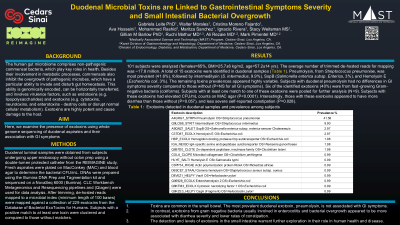Monday Poster Session
Category: Small Intestine
P3213 - Duodenal Microbial Toxins are Linked to Gastrointestinal Symptoms Severity and Small Intestinal Bacterial Overgrowth
Monday, October 28, 2024
10:30 AM - 4:00 PM ET
Location: Exhibit Hall E

Has Audio

Gabriela Leite, PhD
Cedars-Sinai Medical Center
West Hollywood, CA
Presenting Author(s)
Gabriela Leite, PhD1, Walter Morales, 1, Cristina M. Fajardo, MSc1, Ava Hosseini, MPH1, Mohamad Rashid, MD1, Maritza Sanchez, 1, Stacy Weitsman, MS1, Gillian M. Barlow, PhD1, Ruchi Mathur, MD2, Ali Rezaie, MD1, Mark Pimentel, MD1
1Cedars-Sinai Medical Center, West Hollywood, CA; 2Cedars-Sinai Medical Center, Los Angeles, CA
Introduction: The human gut microbiome plays key roles in health. Besides involvement in metabolic processes, commensals also inhibit the growth of pathogenic microbes. This ability involves virulence factors, such as endotoxins (e.g.lipopolysaccharides) and exotoxins (e.g. cytotoxins, neurotoxins, and enterotoxins). Exotoxins are highly potent and cause damage to the host. Here, we examine the presence of exotoxins using whole genome sequencing of duodenal aspirates and their association with GI symptoms.
Methods: Duodenal luminal samples were obtained from subjects undergoing upper endoscopy without colon prep using a double-lumen protected catheter. Fresh aspirates were plated on MacConkey (MAC) and blood agar to determine the bacterial CFU/mL. DNAs were prepared using the Illumina DNA Prep and Tagmentation kit and sequenced on a NovaSeq 6000 (Illumina). CLC Workbench Metagenomics and Resequencing pipelines and (Qiagen) were used for data analysis. After trimming, de-hosted reads mapped to a microbial index (minimum length of 100 bases) were mapped against 229 exotoxins from the Database of Bacterial ExoToxins for Human Subjects with a positive match to at least one toxin were clustered and compared to those without matches.
Results: 101 subjects were analyzed (females=65%, BMI=25.7 ± 6 kg/m2, age=57.2 ± 14 yrs). A total of 15 exotoxins were identified in duodenal samples (Table 1). Pneumolysin, from Streptococcus pneumoniae, was most prevalent (41.6%), followed by intermedilysin (S. intermedius, 9.9%), SopB (Salmonella enterica subsp. Enterica, 3%), and Hemolysin E (Escherichia coli, 3%) (Table 1). The remaining toxins prevalences appeared highly variable (Table 1). Subjects with duodenal pneumolysin had no differences in GI symptoms severity compared to those without (P=NS for all GI symptoms). Six of the identified exotoxins (40%) were from Gram-negative bacteria (coliforms). Subjects with at least one match to one of these exotoxins were pooled for further analysis (N=9). Subjects with these exotoxins had elevated CFU/mL counts on MAC agar (P< 0.0001). Interestingly, those with these exotoxins appeared to have more diarrhea than those without (P=0.057) and less severe self-reported constipation (P=0.028).
Discussion: Toxins are common in the small bowel. The most prevalent duodenal exotoxin, pneumolysin, is not associated with GI symptoms. In contrast, exotoxins from bacteria usually involved in enterocolitis and bacterial overgrowth appeared to be more associated with diarrhea severity.
Note: The table for this abstract can be viewed in the ePoster Gallery section of the ACG 2024 ePoster Site or in The American Journal of Gastroenterology's abstract supplement issue, both of which will be available starting October 27, 2024.
Disclosures:
Gabriela Leite, PhD1, Walter Morales, 1, Cristina M. Fajardo, MSc1, Ava Hosseini, MPH1, Mohamad Rashid, MD1, Maritza Sanchez, 1, Stacy Weitsman, MS1, Gillian M. Barlow, PhD1, Ruchi Mathur, MD2, Ali Rezaie, MD1, Mark Pimentel, MD1. P3213 - Duodenal Microbial Toxins are Linked to Gastrointestinal Symptoms Severity and Small Intestinal Bacterial Overgrowth, ACG 2024 Annual Scientific Meeting Abstracts. Philadelphia, PA: American College of Gastroenterology.
1Cedars-Sinai Medical Center, West Hollywood, CA; 2Cedars-Sinai Medical Center, Los Angeles, CA
Introduction: The human gut microbiome plays key roles in health. Besides involvement in metabolic processes, commensals also inhibit the growth of pathogenic microbes. This ability involves virulence factors, such as endotoxins (e.g.lipopolysaccharides) and exotoxins (e.g. cytotoxins, neurotoxins, and enterotoxins). Exotoxins are highly potent and cause damage to the host. Here, we examine the presence of exotoxins using whole genome sequencing of duodenal aspirates and their association with GI symptoms.
Methods: Duodenal luminal samples were obtained from subjects undergoing upper endoscopy without colon prep using a double-lumen protected catheter. Fresh aspirates were plated on MacConkey (MAC) and blood agar to determine the bacterial CFU/mL. DNAs were prepared using the Illumina DNA Prep and Tagmentation kit and sequenced on a NovaSeq 6000 (Illumina). CLC Workbench Metagenomics and Resequencing pipelines and (Qiagen) were used for data analysis. After trimming, de-hosted reads mapped to a microbial index (minimum length of 100 bases) were mapped against 229 exotoxins from the Database of Bacterial ExoToxins for Human Subjects with a positive match to at least one toxin were clustered and compared to those without matches.
Results: 101 subjects were analyzed (females=65%, BMI=25.7 ± 6 kg/m2, age=57.2 ± 14 yrs). A total of 15 exotoxins were identified in duodenal samples (Table 1). Pneumolysin, from Streptococcus pneumoniae, was most prevalent (41.6%), followed by intermedilysin (S. intermedius, 9.9%), SopB (Salmonella enterica subsp. Enterica, 3%), and Hemolysin E (Escherichia coli, 3%) (Table 1). The remaining toxins prevalences appeared highly variable (Table 1). Subjects with duodenal pneumolysin had no differences in GI symptoms severity compared to those without (P=NS for all GI symptoms). Six of the identified exotoxins (40%) were from Gram-negative bacteria (coliforms). Subjects with at least one match to one of these exotoxins were pooled for further analysis (N=9). Subjects with these exotoxins had elevated CFU/mL counts on MAC agar (P< 0.0001). Interestingly, those with these exotoxins appeared to have more diarrhea than those without (P=0.057) and less severe self-reported constipation (P=0.028).
Discussion: Toxins are common in the small bowel. The most prevalent duodenal exotoxin, pneumolysin, is not associated with GI symptoms. In contrast, exotoxins from bacteria usually involved in enterocolitis and bacterial overgrowth appeared to be more associated with diarrhea severity.
Note: The table for this abstract can be viewed in the ePoster Gallery section of the ACG 2024 ePoster Site or in The American Journal of Gastroenterology's abstract supplement issue, both of which will be available starting October 27, 2024.
Disclosures:
Gabriela Leite indicated no relevant financial relationships.
Walter Morales indicated no relevant financial relationships.
Cristina Fajardo indicated no relevant financial relationships.
Ava Hosseini indicated no relevant financial relationships.
Mohamad Rashid indicated no relevant financial relationships.
Maritza Sanchez indicated no relevant financial relationships.
Stacy Weitsman indicated no relevant financial relationships.
Gillian Barlow indicated no relevant financial relationships.
Ruchi Mathur indicated no relevant financial relationships.
Ali Rezaie: Ardelyx – Consultant. Bausch Health – Consultant, Speakers Bureau. Gemelli Biotech – Stock-privately held company. GoodLFE – Stock-privately held company.
Mark Pimentel: Cylinder Health – Consultant, Stock Options. Dieta Health – Consultant, Stock Options. Ferring – Consultant. Gemelli Biotech – Advisory Committee/Board Member, Intellectual Property/Patents, Stock-privately held company. GoodLFE – Consultant, Stock-privately held company. Salvo Health – Consultant, Stock Options.
Gabriela Leite, PhD1, Walter Morales, 1, Cristina M. Fajardo, MSc1, Ava Hosseini, MPH1, Mohamad Rashid, MD1, Maritza Sanchez, 1, Stacy Weitsman, MS1, Gillian M. Barlow, PhD1, Ruchi Mathur, MD2, Ali Rezaie, MD1, Mark Pimentel, MD1. P3213 - Duodenal Microbial Toxins are Linked to Gastrointestinal Symptoms Severity and Small Intestinal Bacterial Overgrowth, ACG 2024 Annual Scientific Meeting Abstracts. Philadelphia, PA: American College of Gastroenterology.
